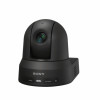Sony BRC-X400 Operating Instructions - Page 86
Referer check tab, Trusted CA certificate, Exception list
 |
View all Sony BRC-X400 manuals
Add to My Manuals
Save this manual to your list of manuals |
Page 86 highlights
To display client certificate information When the client certificate has been set in the camera correctly, its information appears on [Status], [Issuer DN], [Subject DN], [Available period] and [Extended key usage]. Status Shows if the status of the client certificate is valid or invalid. The following statuses are recognized. [Valid]: The client certificate is correctly stored and set. [Invalid]: The client certificate is not correctly stored and set. Possible causes are as follows: - The private key password included in the client certificate is not specified correctly. - The private key password is specified in spite of the fact that the key pair in the client certificate is not encrypted. - The key pair is not included in the client certificate. Note When the client certificate to be imported is of PKCS#12 format and the private key password is not set correctly, "" is displayed in the boxes of [Issuer DN], [Subject DN], [Available period] and [Extended key usage]. Specify the correct private key password to confirm the information of the certificate. To delete the client certificate Click [Delete] to delete the client certificate stored in the camera. Private key password Enter the password for the private key information included in client certificate using up to 50 characters. Leave the text box blank if the private key information included in the client certificate is not encrypted. If a private key password is already set, it is displayed as turned letters. Reset To change the once set private key password, click [Reset] and clear the current password. A new password can be entered. Note Click at the bottom of the menu if you want to cancel changing the private key password after clicking [Reset]. Doing so restores the other setting items in the Client certificate tab to the previous settings. Trusted CA certificate You can import a trusted CA certificate (server certificate or route certificate) to the camera. Up to 4 certificates from trusted CAs can be imported. Only the PEM format is supported. To import the CA certificate Click [Choose File] to select the CA certificate to be imported. The selected CA certificate is imported to the camera. Note The import process becomes invalid if the selected file is not a CA certificate. To display CA certificate information When the CA certificate has been set in the camera correctly, its information appears on [Issuer DN], [Subject DN], [Available period] and [Extended key usage]. To delete the CA certificate Click [Delete] to delete the CA certificate stored in the camera. Referer check tab Referer check is the function that checks if the web page which requires access to the camera is authorized. If the web page is not authorized, the camera denies access of the web page. If you want to access from web pages other than the one that the camera provides, register their host names and port numbers in the [Exception list]. Referer check Enable Select the checkbox to enable the Referer check. Exception list Register the hosts that are not targeted for the Referer check. No. Select the registration number for the Exception list. 86















